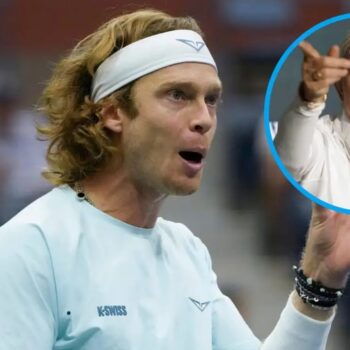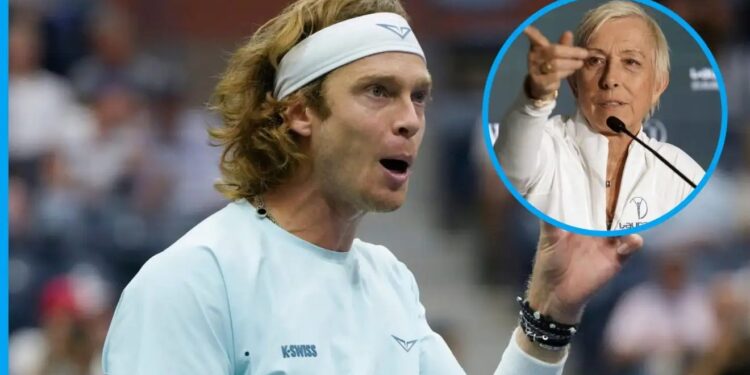**Martina Navratilova Shocked by Andrey Rublev: “He Beats Himself”**

Tennis legend Martina Navratilova has often provided sharp insights on the modern game, and her recent comments about Russian tennis star Andrey Rublev have left fans and pundits alike intrigued.
Navratilova expressed her concern over Rublev’s tendency to mentally unravel during key moments in matches, stating, “He beats himself.” This critique came in light of several recent matches where Rublev, despite showing flashes of brilliance, fell short of closing out crucial victories, often due to mental lapses and emotional breakdowns on the court.
### **Navratilova’s Concern: Rublev’s Mental Game**
Andrey Rublev, a top-10 player known for his powerful groundstrokes and aggressive playing style, has been hailed as one of the rising stars of men’s tennis.
However, Navratilova’s remarks highlight an ongoing issue with Rublev’s mental fortitude, especially during high-pressure moments. According to the tennis icon, Rublev has the physical tools and technical abilities to compete at the highest level, but his mental game remains a significant stumbling block.
In particular, Navratilova pointed out that Rublev often struggles with his emotions, allowing frustration and anger to dictate his play when things don’t go his way.
“He has all the shots, but the mental piece is missing sometimes,” she remarked, emphasizing that Rublev’s inability to maintain composure in key moments often costs him matches he should be winning. “It’s like he’s fighting two battles – one against his opponent and another against himself.”
Navratilova’s observation rings especially true when analyzing Rublev’s performances in the later stages of Grand Slam tournaments.
He has reached multiple quarterfinals but has yet to break through to a semifinal or final, often faltering in matches where he’s either in control or has the opportunity to swing momentum in his favor.
### **Rublev’s Emotional Struggles on Court**
Rublev is known for wearing his heart on his sleeve during matches, which can be both a strength and a weakness. His fiery passion often fuels his aggressive, high-energy play, but it can also lead to emotional outbursts when he makes mistakes or faces adversity.
These outbursts, characterized by yelling, smashing racquets, or arguing with himself, have become a familiar sight for tennis fans.
Navratilova, a champion with a record 59 Grand Slam titles (singles and doubles combined), has seen countless players struggle with emotions on the court.
But what shocks her about Rublev is the consistency with which he lets his emotions disrupt his rhythm and focus. In her view, Rublev’s volatility is his Achilles’ heel, preventing him from reaching his full potential in the sport.
“He beats himself,” Navratilova said, suggesting that many of Rublev’s losses come not because his opponents are playing better, but because he is unable to control his own emotions and stay focused in crucial moments.
She believes this mental barrier is what’s stopping Rublev from becoming a Grand Slam champion, even though he has the talent to be a consistent contender.
### **Recent Matches That Reflect Navratilova’s Criticism**
Several matches in Rublev’s career demonstrate the pattern that Navratilova described. A prime example came during the 2023 Australian Open quarterfinal, where Rublev faced off against nine-time champion Novak Djokovic.
Despite playing well in patches, Rublev became visibly frustrated when Djokovic’s defense held strong, and his own errors began to pile up.
His emotional frustration boiled over, leading to an even more erratic performance. Djokovic won in straight sets, and Rublev left the court dejected, knowing he hadn’t played his best tennis.
This was not an isolated incident. Rublev’s quarterfinal loss at the 2022 US Open to Frances Tiafoe similarly showcased his emotional struggles.
In that match, Rublev broke down in tears during a changeover, overwhelmed by the situation and his inability to execute under pressure. The emotional toll was evident, as he struggled to regroup and regain focus, ultimately losing in straight sets.
Navratilova’s analysis resonates with the patterns seen in Rublev’s performances during these big-stage matches.
While many players face mental challenges, Rublev’s emotional outbursts and self-critical tendencies are particularly damaging because they happen so frequently and visibly affect his game.
### **Rublev’s Response to Criticism**
Andrey Rublev is no stranger to discussions about his mental game. In interviews, he has acknowledged his struggles with managing emotions on court and has spoken openly about the pressure he feels during important matches.
“I’m trying to get better,” he said in a post-match press conference after his loss to Tiafoe at the US Open. “Sometimes, I can control it, and other times, I can’t.”
Rublev has also mentioned working with mental coaches to improve his emotional resilience and ability to stay focused under pressure.
While he has made progress in recent years, with notable improvements in his results at ATP tournaments and an increased ranking, the mental aspect remains a work in progress.
Navratilova’s comments might serve as a wake-up call for Rublev. If a tennis great like her sees his mental game as a key obstacle, it might push him to focus even more on his emotional regulation and mental strength, especially in the later stages of tournaments where the pressure is highest.
### **Navratilova’s Advice for Rublev**
While Navratilova’s critique of Rublev was blunt, it was also constructive. She emphasized that Rublev has all the tools to succeed at the highest level, but he needs to work on the mental side of the game.
“He needs to stay in the moment, not get ahead of himself, and not let the frustrations take over,” she advised.
Navratilova also suggested that Rublev could benefit from working with a coach or sports psychologist who specializes in mental toughness.
“It’s not just about hitting the ball – it’s about staying calm, staying focused, and believing in yourself, even when things aren’t going perfectly,” she said.
This type of mental coaching has worked wonders for other top players, such as Novak Djokovic, who famously struggled with emotional outbursts earlier in his career but has since become one of the most mentally resilient athletes in sports.
If Rublev can follow a similar path, Navratilova believes he could reach his full potential and start contending for Grand Slam titles regularly.
### **Conclusion: Rublev’s Journey to Overcome Mental Barriers**
Martina Navratilova’s comments about Andrey Rublev highlight a key aspect of the young Russian’s game that has held him back from achieving even greater success.
While Rublev has proven himself to be one of the most talented players on the ATP Tour, his emotional struggles and mental lapses during critical moments have prevented him from reaching the heights that his physical abilities suggest he could attain.
Navratilova’s critique is not meant to tear Rublev down but to point out an area for improvement that could unlock his potential.
If Rublev can work on his mental toughness and find a way to control his emotions on court, there’s no doubt he can compete for Grand Slam titles and establish himself as a consistent threat at the top of the game.
As Rublev continues his career, fans and analysts will be watching closely to see if he can heed Navratilova’s advice and conquer the mental barriers that have thus far stood in his way.
For now, the tennis world waits to see if Rublev can transform his immense talent into the kind of results that match his abilities.










